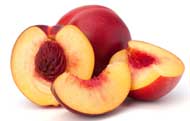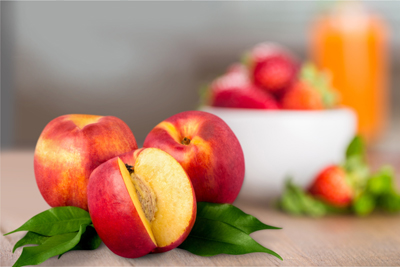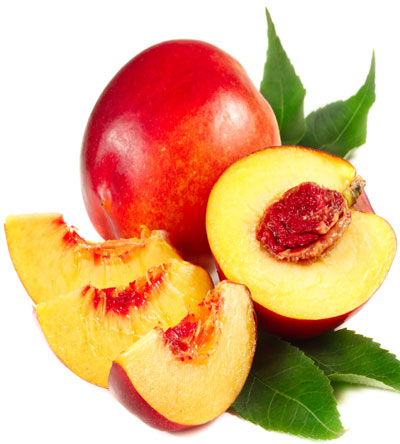





1. Nectarine Facts
2. Types of Nectarines
3. Nutritional Value of Nectarines
4. Health Benefits of Nectarines
The nectarine's scientific name is Prunus persica var. nucipersica, which is a variety of the peach (Prunus persica). Nectarines and peaches both belong to the Rosaceae family, also known as the rose family.
The nectarine is a smooth-skinned stone fruit, genetically identical to a peach but with a recessive gene that results in its lack of fuzz. It has a smooth, red and yellow skin and can have yellow, white, or red flesh.
History and Origin
Nectarines originated in China more than 2,000 years ago and are a genetic variant of the peach. They were introduced to ancient Persia, Greece, and Rome before spreading to Europe in the 16th century and the Americas via the Spanish in the 19th century. Today, nectarines are distributed globally in warm to cool temperate regions and are heavily cultivated in California, the Mediterranean, and Australia.
Common nectarine types grown and sold in Australia include both yellow-flesh and white-flesh varieties, with many available in dwarf forms. Popular yellow-flesh varieties include 'Flavortop' and 'May Grand,' while well-known white-flesh options are 'Arctic Rose' and 'Goldmine'. Other options include the 'TangO's™' flat nectarine and the 'Fantasia'.
Yellow-flesh varieties
Flavortop: A popular variety that is freestone and has yellow flesh. A dwarf version is available for home gardens.
May Grand: A freestone, yellow-fleshed variety.
Nectazee: A freestone, yellow-fleshed variety that is often available in a dwarf form (Trixzie® Nectazee).
Sundowner: A freestone variety with yellow flesh that is well-suited to warmer Australian climates.
White-flesh varieties
Arctic Rose: A new generation of white-fleshed nectarine that is picked and eaten when firm.
Goldmine: A freestone variety with white flesh. A multi-graft option is also available.
Queen Giant: A freestone variety with white flesh.
Snow Queen: Described as being very sweet and juicy with white flesh.
Other types
TangO's™: A unique flat-shaped nectarine.
Fantasia: A variety with yellow flesh that is also available in a semi-dwarf tree form.
Peacharine: A hybrid cross between a peach and a nectarine, featuring a complex flavour.
Fruit ” Nectarine ” ( Nutritional value )
Nutritional value per 100 g
Nectarines, raw
|
Nutrient ( Proximate’s )
|
Unit
|
Value
|
Daily Value %
|
|
Energy
|
kcal
|
44
|
2.2%
|
|
Protein
|
g
|
1.06
|
2.1%
|
|
Total lipid (fat)
|
g
|
0.32
|
0.4%
|
|
Carbohydrate, by difference
|
g
|
10.55
|
3.8%
|
|
Fiber, total dietary
|
g
|
1.7
|
6.0%
|
|
Sugars, total
|
g
|
7.89
|
|
|
Minerals
|
|||
|
Calcium, Ca
|
mg
|
6
|
0.4%
|
|
Iron, Fe
|
mg
|
0.28
|
1.5%
|
|
Magnesium, Mg
|
mg
|
9
|
2.1%
|
|
Phosphorus, P
|
mg
|
26
|
2.0%
|
|
Potassium, K
|
mg
|
201
|
4.2%
|
|
Sodium, Na
|
mg
|
0
|
|
|
Zinc, Zn
|
mg
|
0.17
|
1.5%
|
|
Copper, Cu
|
mg
|
0.086
|
9.5%
|
|
Manganese, Mn
|
mg
|
0.054
|
2.3%
|
|
Selenium, Se
|
mcg |
0.0
|
|
|
Vitamins
|
|||
|
Vitamin C, total ascorbic acid
|
mg
|
5.4
|
6.0%
|
|
Thiamin (B-1)
|
mg
|
0.034
|
2.8%
|
|
Riboflavin (B-2)
|
mg
|
0.027
|
2.0%
|
|
Niacin (B-3)
|
mg
|
1.125
|
7.0%
|
|
Pantothenic acid (B-5)
|
mg
|
0.185
|
3.6%
|
|
Vitamin B-6
|
mg
|
0.025
|
1.4%
|
|
Vitamin B-12
|
mg
|
0.00
|
|
|
Folate DFE (dietary folate) (B-9)
|
mcg
|
5
|
1.2%
|
|
Vitamin A, RAE (retinol)
|
mcg
|
21
|
2.3%
|
|
Vitamin E (alpha-tocopherol)
|
mg
|
0.77
|
5.1%
|
|
Vitamin D (D2 + D3)
|
mcg
|
0
|
|
|
Vitamin K (phylloquinone)
|
mcg
|
2.2
|
1.8%
|
|
Lipids
|
|||
|
Saturated Fatty Acids
|
g
|
0.025
|
0.1%
|
|
Monounsaturated Fatty Acids
|
g
|
0.088
|
|
|
Polyunsaturated Fatty Acids
|
g
|
0.113
|
|
|
Trans Fatty Acids
|
g
|
0.000
|
|
|
Carotenoids
|
|||
|
Beta-Carotene
|
mcg
|
150
|
|
|
Beta-Cryptoxanthin
|
mcg
|
98
|
|
|
Lutein + zeaxanthin
|
mcg
|
130
|
|

|
Reference Values are based on a 2,000 Calorie Intake, for Adults and Children 4 or More Years of Age. Your daily values may be higher or lower depending on your calorie needs.
|
|
Percentages are roughly approximated using (RDA) Recommended Dietary Allowances for adults. Source: Nutrient Database – USDA (United States Department of Agriculture)
|
|
Reference Values for Nutrition – FDA U.S. Food and Drug Administration
|
Nectarine Nutritional Value
Nectarines provide numerous health benefits, including supporting vision, boosting the immune system, and improving heart and skin health due to their high content of antioxidants, vitamins C and A, and fiber. They are also low in calories and can aid in weight management, while compounds in the fruit may help protect against chronic conditions like diabetes and certain cancers.
- ANTIOXIDANT POWER
Nectarines have high antioxidant power due to compounds like vitamin C, carotenoids, and polyphenols, which combat oxidative stress and protect cells from damage by neutralizing free radicals. This antioxidant activity can help reduce the risk of chronic diseases like cancer, heart disease, and Alzheimer's, support eye and skin health, and boost the immune system. - CANCER PREVENTION
The antioxidants in nectarines have many health benefits, but one type of antioxidant in particular — polyphenols — may even combat cancer. Research suggests that polyphenols, which are also found in tea, coffee, dark chocolate and many plant foods, may make it harder for cancer cells to survive and multiply. - DIGESTIVE AND WEIGHT MANAGEMENT
Nectarines support digestive health due to their high fiber content, which promotes regularity and feeds healthy gut bacteria. They aid weight management because the fiber increases fullness, while the fruit itself is low in calories, making it a good substitute for high-calorie snacks. - HEART HEALTH
Nectarines benefit heart health by providing potassium to help lower blood pressure, and fiber to help reduce cholesterol. They also contain antioxidants, such as vitamins C and A, and polyphenols, which can reduce inflammation in blood vessels and protect against oxidative stress associated with heart disease.

- IMMUNE SYSTEM SUPPORT
Nectarines support the immune system primarily through their high content of vitamin C, which helps strengthen the skin's barrier against pathogens, boosts the function of immune cells, and promotes the regeneration of vitamin E. They also provide vitamin A from beta-carotene, which helps fight infections, and antioxidants that protect cells and support overall immune function. - SKIN HEALTH
Nectarines support skin health primarily through their high levels of vitamins A and C, which protect against UV damage and support collagen production. They also contain antioxidants, niacin, and copper, which help fight free radicals, reduce inflammation, and maintain skin elasticity. - VISION SUPPORT
Nectarines support vision through antioxidants like lutein and zeaxanthin, which protect the retina, and beta-carotene, which converts to vitamin A, essential for vision and preventing dryness. These compounds help shield the eyes from harmful light and are crucial for maintaining macular health. - REDUCES INFLAMMATION
Nectarines can help reduce inflammation due to their high antioxidant content, including vitamins, polyphenols, and carotenoids, which combat oxidative stress and may prevent chronic diseases. This is because these compounds neutralize harmful free radicals and help decrease inflammation in blood vessels, improve immune function, and reduce the risk of conditions like heart disease.
References
Nutrient Database – USDA (United States Department of Agriculture)
Reference Values for Nutrition – FDA U.S. Food and Drug Administration
Antioxidant power - Nectarines have high antioxidant power due to compounds like vitamin C, carotenoids, and polyphenols, which combat oxidative stress and protect cells from damage by neutralizing free radicals. This antioxidant activity can help reduce the risk of chronic diseases like cancer, heart disease, and Alzheimer's, support eye and skin health, and boost the immune system.
Vision support - Nectarines support vision through antioxidants like lutein and zeaxanthin, which protect the retina, and beta-carotene, which converts to vitamin A, essential for vision and preventing dryness. These compounds help shield the eyes from harmful light and are crucial for maintaining macular health.
Immune system support - Nectarines support the immune system primarily through their high content of vitamin C, which helps strengthen the skin's barrier against pathogens, boosts the function of immune cells, and promotes the regeneration of vitamin E. They also provide vitamin A from beta-carotene, which helps fight infections, and antioxidants that protect cells and support overall immune function.
Heart health - Nectarines benefit heart health by providing potassium to help lower blood pressure, and fiber to help reduce cholesterol. They also contain antioxidants, such as vitamins C and A, and polyphenols, which can reduce inflammation in blood vessels and protect against oxidative stress associated with heart disease.
Digestive and weight management - Nectarines support digestive health due to their high fiber content, which promotes regularity and feeds healthy gut bacteria. They aid weight management because the fiber increases fullness, while the fruit itself is low in calories, making it a good substitute for high-calorie snacks.
Skin health - Nectarines support skin health primarily through their high levels of vitamins A and C, which protect against UV damage and support collagen production. They also contain antioxidants, niacin, and copper, which help fight free radicals, reduce inflammation, and maintain skin elasticity.
Cancer prevention - The antioxidants in nectarines have many health benefits, but one type of antioxidant in particular — polyphenols — may even combat cancer. Research suggests that polyphenols, which are also found in tea, coffee, dark chocolate and many plant foods, may make it harder for cancer cells to survive and multiply.
Reduces inflammation - Yes, nectarines can help reduce inflammation due to their high antioxidant content, including vitamins, polyphenols, and carotenoids, which combat oxidative stress and may prevent chronic diseases. This is because these compounds neutralize harmful free radicals and help decrease inflammation in blood vessels, improve immune function, and reduce the risk of conditions like heart disease.
For More Information
Nectarine (Peach) – From Wikipedia, the free encyclopedia
A nectarine is a smooth-skinned variety of a peach, belonging to the same species (Prunus prunus). They are not a hybrid but rather a natural genetic variant, distinguished by a single gene that results in a lack of fuzziness on the skin.
Share
